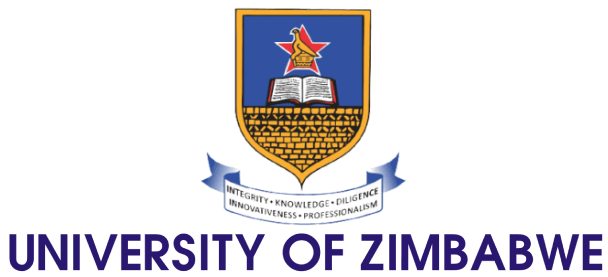Senior Lecturer

Prof. V. Dzingirai
Bio: Prof Dzingirai studied Sociology and Social Anthropology at the University of Zimbabwe. His academic qualifications include BSc Sociology and Social Anthropology (1989), MPhil in Sociology and Social Anthropology (1990 and a PhD in Applied Social Sciences (1996). The PhD thesis was on migration and community based natural resources management. Professor Dzingirai teaches Modules in MSc Socio-Ecological Systems and Development Practice. He teaches Modules which include Fortress Conservation and Community Development, Tools for Ecological Monitoring and Sociology of the Environment. Professor Dzingirai continues to mentor doctoral and MPhil candidates both locally and externally. He has also examined post graduate candidates in the region. Together with other colleagues, Professor Dzingirai continues to mobilise resources to support students pursuing PhD studies. He has a current grant with Andrew Mellon Foundation.
Email: This email address is being protected from spambots. You need JavaScript enabled to view it.
Phone number: 263 772 312 512
Publications
Books Chapters
1. Dzingirai, V. (1992). Cultural manipulation and legitimation, the case of Zimbabwe. In Hunter, J., and Lombard, C. (1992). Multiparty Democracy, Civil society and Economic Transformation in Southern Africa. Windoek: University of Namibia.
2. Dzingirai, V. (2004). The culture of giving and its relationship to saving. In Lonte, H., and Hospes, O. (Eds.). Livelihood and Microfinance: Anthropological and Sociological Perspective on savings and Debt. Amsterdam: Eburon Academic Publishers.
3. Dzingirai, V. (2003). Resettlement and contract farming in Zimbabwe Delivering Land and Securing Rural Livelihoods. In Roth, M., and Gones, F. (2003). Centre for Applied Social Sciences and Land Tenure Centre, University of Wisconsin-Madison
4. Dzingirai, V. and Breen, C. (2005). The community-based natural resources management crisis and the research issue. In Dzingirai, V. and Breen, C. (Eds) (2005). Confronting the Crisis in Community Conservation: Case Studies from Southern Africa, CEAD, University of KwaZulu Natal, 1-9.
5. Dzingirai, V. (2005). Key perspectives in the CBNRM crisis in southern Africa. In Dzingirai, V. and Breen, C. (Eds) (2005). Confronting the Crisis in Community Conservation: Case Studies from Southern Africa, CEAD, University of KwaZulu Natal, 308 – 313.
6. Andersson, J. A., Dzingirai, V., and Cumming, D. H. M (2010). TFCAs and the invisible peoples: People at wildlife frontiers in Southern Africa Transfrontier Conservation Areas People Living on the Edge. In Andersson, J.A., De Garine_Witchatitsky, M., Cumming, D., Dzingirai, V., and Giller, K. London: Earthscan.
7. Manzungu, E., Mangwanya, L., and Dzingirai, V. (2012). Can Collective Action Lead to Sustainable Outcomes in the Provision and Management of Domestic Water in Zimbabwean Urban Areas? Journal of Sustainable Social Development in Africa, 5.
8. Dzingirai, V., Manzungu, E. and Nyamwanza, O. (2005). The Fast-track Land Reform Programme Impacts on the Environment
9. Manzungu, E., Dzingirai, V., Ncube, P., and Rosen, T. (2012). The Relevance and Applicability of Performance Indicators in the Limpopo River Basin in Zimbabwe. Journal of Sustainable Social Development in Africa, 7(1), 39-66.
10. Manzungu, E., and Dzingirai, V. (2012). Towards Empowered Stakeholder Participation in Water Resource Management in Zimbabwe. Journal of Social Development in Africa, 27 (1).
Refereed Journals
1. Dzingirai, V. (2009). The impact of political crisis on natural resources: a case study of Zimbabwe. Africa Insight, 39 (3), 24-37.
2. Dzingirai, V., Mashava, R., and Shayamano, A. (2009). Resisting new concepts: Incoorporating of community-based conservation. Zimbabwe Journal of Education, 21 (1),15-25.
3. Dzingirai, V. (2005). Interest persistent nella tutel ambienntale: il caso del programma CAMPFIRE in Zimbabwe. Africa Oriente, 7 (2), 67-81.
4. Dzingirai, V. (2003). The New Scramble for the African Countryside. Journal of Development and Change, 24 (2), 243-265.
5. Dzingirai, V. (2003). There is no place for Ndebele in CAMPFIRE: The Conflict over Land in the Zambezi Valley of Zimbabwe. Journal of Southern African Studies, 29 (2), 445-461.
6. Dzingirai, V. (2000). Migration and the future of CAMPFIRE in the Zambezi Valley. Commons Southern Africa, 2 (1), 15-16.
7. Dzingirai, V. (1999). Land Reform and Community-based natural resources Management programme in Southern Africa. Common Property Digest, 51, 1-4.
8. Dzingirai, V. (1999). This good land is not for elephants’ Poverty, Migration and Development in Binga. Journal of Social Sciences, 3(4), 265-271.
9. Dzingirai, V., and Bourdillon, M.F.C. (1998). Religious ritual and political control in Binga district, Zimbabwe. African Anthropology, 10 (7), 526-567.
10. Dzingirai, V. (1994). Politics and ideology in human settlement: getting started in Sikomena area of Chief Dobola, Binga. Zambezia, 21(2),176-176.
11. Dzingirai, V. (1996). Every man must settle where they want: The politics of settlement in the context of Communal Area Management Programme for Indigenous Resources CAMPFIRE. Zambezia, 23 (2), 19-30.
12. Dzingirai, V., and Madzudzo, E. (1995). Big Men in CAMPFIRE: A comparative study of the role of ethnicity on CAMPFIRE. Zambezia, 24(2), 25-42.
13. Dzingirai, V. (2010). Social groups and livelihoods. Southern Africa Land and Agrarian Network, 1 (4), 6-8.
14. Dzingirai V. (2015). Moving interdisciplinary science forward: integrating participatory modelling with mathematical modelling of zoonotic disease in Africa. Infectious Disease Journal, 13 (2).
15. Tagutanazvo, E., Dzingirai, V., Mapedza, E., and Koppen, B. V. (2015). Gender Dynamics in Water Governance Institutions: The case of Gwanda’s Guyu-Chelesa Irrigation Scheme in Zimbabwe, H2O Journal.
16. Dzingirai V. (2016). Zoonotic Diseases: Who gets sick and why? Explorations from Africa’, ‘Critical Health Policy’.
Book Reviews
1. Dzingirai, V. (1992). Cultural manipulation and legitimation, the case of Zimbabwe. In Hunter, J., and Lombard, C. (1992). Multiparty Democracy, Civil society and Economic Transformation in Southern Africa. Windoek: University of Namibia.
2. Dzingirai, V. (2004). The culture of giving and its relationship to saving. In Lonte, H., and Hospes, O. (Eds.). Livelihood and Microfinance: Anthropological and Sociological Perspective on savings and Debt. Amsterdam: Eburon Academic Publishers.
3. Dzingirai, V. (2003). Resettlement and contract farming in Zimbabwe Delivering Land and Securing Rural Livelihoods. In Roth, M., and Gones, F. (2003). Centre for Applied Social Sciences and Land Tenure Centre, University of Wisconsin-Madison
4. Dzingirai, V. and Breen, C. (2005). The community-based natural resources management crisis and the research issue. In Dzingirai, V. and Breen, C. (Eds) (2005). Confronting the Crisis in Community Conservation: Case Studies from Southern Africa, CEAD, University of KwaZulu Natal, 1-9.
5. Dzingirai, V. (2005). Key perspectives in the CBNRM crisis in southern Africa. In Dzingirai, V. and Breen, C. (Eds) (2005). Confronting the Crisis in Community Conservation: Case Studies from Southern Africa, CEAD, University of KwaZulu Natal, 308 – 313.
6. Andersson, J. A., Dzingirai, V., and Cumming, D. H. M (2010). TFCAs and the invisible peoples: People at wildlife frontiers in Southern Africa Transfrontier Conservation Areas People Living on the Edge. In Andersson, J.A., De Garine_Witchatitsky, M., Cumming, D., Dzingirai, V., and Giller, K. London: Earthscan.
7. Manzungu, E., Mangwanya, L., and Dzingirai, V. (2012). Can Collective Action Lead to Sustainable Outcomes in the Provision and Management of Domestic Water in Zimbabwean Urban Areas? Journal of Sustainable Social Development in Africa, 5.
8. Dzingirai, V., Manzungu, E. and Nyamwanza, O. (2005). The Fast-track Land Reform Programme Impacts on the Environment
9. Manzungu, E., Dzingirai, V., Ncube, P., and Rosen, T. (2012). The Relevance and Applicability of Performance Indicators in the Limpopo River Basin in Zimbabwe. Journal of Sustainable Social Development in Africa, 7(1), 39-66.
10. Manzungu, E., and Dzingirai, V. (2012). Towards Empowered Stakeholder Participation in Water Resource Management in Zimbabwe. Journal of Social Development in Africa, 27 (1).



